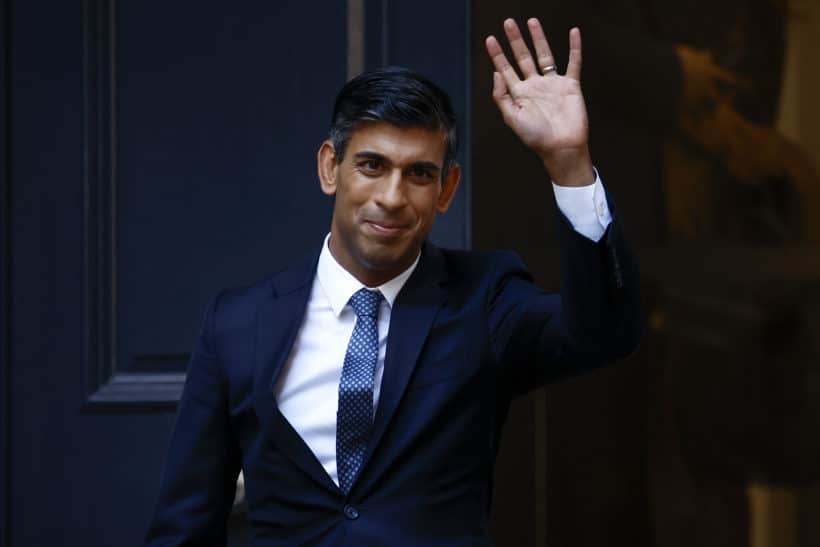
Jeff J Mitchell | Getty Images News | Getty Images
Britain’s new Prime Minister Rishi Sunak is set to assume office Tuesday and, with it, one of the most daunting political in-trays in modern British history as he attempts to steer the country through an existing cost-of-living crisis, political and social disjuncture, and a looming recession.
The former finance minister was named leader of the Conservative Party — and therefore the country’s next prime minister — on Monday, after his sole competitor, Penny Mordaunt, pulled out of the leadership race moments before the nominations deadline.
The 42-year-old will be officially installed in the role Tuesday morning by King Charles III, whom he will meet at Buckingham Palace after outgoing Prime Minister Liz Truss formally tenders her resignation to the monarch.
Sunak’s officiation is momentous not least in that it marks Downing Street’s first prime minister of color and the U.K.‘s youngest leader of modern times. It is also King Charles’ first swearing in of a new government, coming just seven weeks after his late mother, Queen Elizabeth II, appointed Truss, who resigned 44 days later.
But also because it comes at a time of profound political and economic crisis for the country, with the challenges in Sunak’s in-tray from day one spanning economic instability, soaring inflation, stretched public finances, industrial unrest and party politics.
The economy in focus
Sunak has so far given little away about his plans once in office, ascending to the top job virtually in silence following a fast-tracked leadership race over the weekend.
However, as a former finance minister who steered Britain through the Covid-19 pandemic, recovering the U.K.’s embattled economy and the country’s status among the investment community is likely to be a top priority.
In a brief speech Monday, Sunak said he was determined to overcome the “profound economic challenge” facing the country and pledged to bring about “stability and unity.”
It is expected that Sunak will retain the current Finance Minister Jeremy Hunt, who is credited with calming markets following the Truss government’s cataclysmic mini-budget, and who is due to set out the country’s revised fiscal strategy Monday.
Economists said that could go some way in reasserting the U.K.’s economic stability, but added that investors will be closely watching the forthcoming budget to see exactly how the pair plan to fill a gaping £40 billion ($45 billion) in the public finances.
“If the fiscal rules are too loose and/or the policies announced to fill the fiscal hole are considered unachievable, this won’t rebuild credibility with investors,” Ruth Gregory, senior U.K. economist at Capital Economics, wrote in a research note Monday.
Soaring inflation and industrial unrest
Still, while Sunak is seen as having safer fiscal hands than his predecessor, investors have warned that any relief rally in financial markets may be short-lived, as the new government has a long way to go in resolving the country’s wider economic ills.
The U.K. is the only G-7 economy not to have re-attained its pre-pandemic GDP level by the second quarter of 2022. Indeed, the economy shrank by 0.3% in August, according to the Office for National Statistics, with some ratings agencies predicting the U.K. is already in a full-year recession.
It comes as the U.K. faces a labor crunch and continued industrial unrest, with widespread strikes among postal workers, rail workers and public barristers having led to months of disruption.
Meanwhile, U.K. inflation returned to a 40-year high of 10.1% in September, and energy prices continue to push higher following Russia’s war in Ukraine, with some energy providers warning of possible blackouts this winter.
“The U.K. still faces a storm of economic problems,” Nigel Green, CEO, deVere Group, said in a note Monday. “There’s the brewing deep and painful recession, soaring energy prices, inflation running at more than 10%, labor gaps, ongoing supply chain dramas, and the Bank of England intent on hiking interest rates.”
Uniting a divided Conservative Party
Sunak’s task as prime minister is further complicated by deep-rooted divisions within the ruling Conservative Party.
Despite winning significant backing from Tory members of parliament, Sunak is considered a divisive figure within the party, and was largely blamed for the demise of former Prime Minister Boris Johnson, after he quit as his finance minister.
Sunak’s success will therefore closely depend on his ability to galvanize his party and unite them under his new economic and political vision.
Closely watched over the coming days will be Sunak’s appointment of his cabinet, which will provide him an opportunity to overhaul the top ranks of the party and appoint a broad church of ministers from across Tory factions.
The U.K.’s Foreign Secretary James Cleverly told Sky News Tuesday that Sunak’s government should feature the best ministers available — rather than focusing on those who are loyal — as Truss was criticized for doing.
“We have got to have the first 15 on the pitch. I know that Rishi understands that,” Cleverly said.